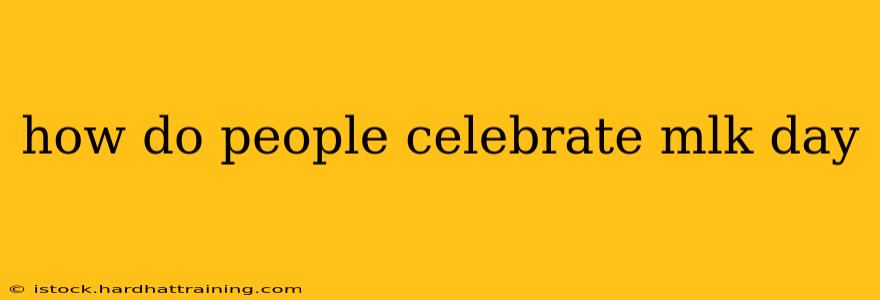Martin Luther King Jr. Day, observed annually on the third Monday of January, is more than just a holiday; it's a national day of service and reflection dedicated to the legacy of Dr. Martin Luther King Jr. and his unwavering commitment to civil rights and social justice. Celebrations vary widely across the country, reflecting the diverse ways people choose to honor his memory and continue his work.
Remembering Dr. King: Acts of Remembrance and Reflection
Many individuals and communities begin their MLK Day by attending religious services or interfaith gatherings. These events often feature sermons, speeches, and musical performances that explore Dr. King's philosophy of nonviolent resistance and his enduring message of hope and equality. These services serve as a powerful moment of reflection, reminding us of the struggles faced during the Civil Rights Movement and the ongoing fight for justice.
Others choose more personal acts of remembrance. This might involve reading Dr. King's speeches, such as his iconic "I Have a Dream" address, or studying his life and contributions through biographies and documentaries. Spending time with family, sharing stories about Dr. King's impact, and engaging in thoughtful conversations about his legacy can be equally meaningful.
Community Involvement: The Spirit of Service
A cornerstone of MLK Day celebrations is the emphasis on service. Dr. King's belief in the power of collective action is deeply ingrained in the spirit of the holiday. Many people participate in volunteer activities, embodying the call to action inherent in his message. These activities can take various forms:
Volunteering Opportunities:
- Community clean-ups: Participating in local clean-up initiatives helps improve neighborhoods and demonstrates a commitment to community well-being.
- Food drives and soup kitchens: Providing food and assistance to those in need aligns perfectly with Dr. King's focus on social justice and economic equality.
- Mentoring programs: Guiding and supporting young people embodies the spirit of investing in the future, mirroring Dr. King’s dedication to progress.
- Voter registration drives: Encouraging civic participation underscores the importance of democratic engagement, a cornerstone of Dr. King's legacy.
- Educational initiatives: Volunteering at schools or supporting literacy programs reflects a commitment to education and equal opportunities.
These activities are not just about lending a hand; they represent a powerful way to honor Dr. King's memory by actively contributing to positive change.
Educational Events and Commemorations
Many institutions, organizations, and schools host educational events to mark MLK Day. These can include lectures, workshops, film screenings, and discussions focusing on various aspects of Dr. King's life, work, and the ongoing fight for racial justice. These events provide opportunities for learning, dialogue, and deeper engagement with the complex issues he addressed. Many museums and historical sites also host special exhibitions and programs related to the Civil Rights Movement.
Parades and Marches: Public Demonstrations of Solidarity
In several cities across the nation, marches and parades are organized to commemorate MLK Day. These events serve as public displays of solidarity, bringing together diverse communities to reaffirm their commitment to Dr. King's ideals. These marches often combine elements of remembrance, celebration, and calls for continued action toward racial and social justice.
Continuing the Legacy: Beyond a Single Day
The true spirit of MLK Day extends beyond a single day of celebration. It's a call to ongoing action, a commitment to actively working toward a more just and equitable society. Remembering Dr. King's life and work inspires us to continue the fight against injustice in all its forms, embracing his philosophy of nonviolent resistance and striving to build a world where his dream of equality becomes a reality for all. The celebrations are a reminder of the ongoing work required to make his dream a lasting reality.
